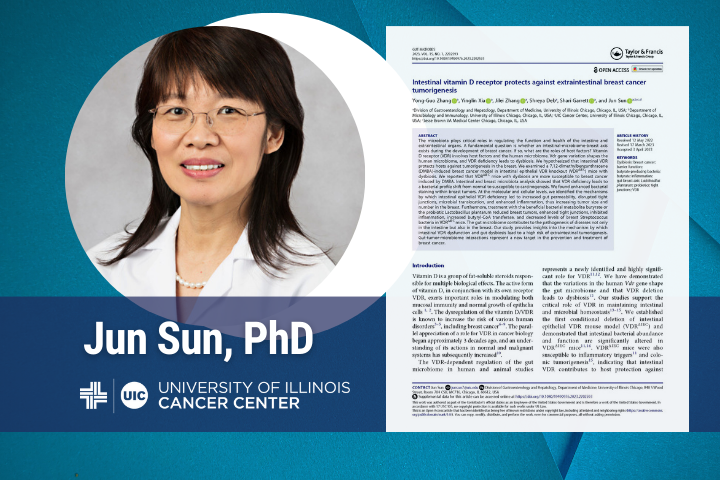
New research published in the journal Gut Microbes suggests that gut-tumor-microbiome interactions represent a new target in the prevention and treatment of breast cancer, according to study authors who include University of Illinois Cancer Center member Jun Sun, PhD, as the corresponding author.
The gut microbiota is critical for the health and functioning of not only the intestine but also other organs. Vitamin D receptor (VDR) deficiency in the intestine leads to dysbiosis, which is an imbalance and a dysfunction in the gut microbial community.
Cancer Biology
In the current study, researchers examined a 7,12-dimethylbenzanthracene (DMBA)-induced breast cancer model in intestinal epithelial VDR knockout mice with dysbiosis.
In their paper published in April, “Intestinal vitamin D receptor protects against extraintestinal breast cancer tumorigenesis,” researchers reported that intestinal VDR knockout mice with dysbiosis are more susceptible to breast cancer induced by DMBA. Moreover, treating the mice with beneficial microbial metabolite or a probiotic strain could reduce the tumor size and number in the mice.
New Cancer Target
“Intestinal and breast microbiota analysis showed that VDR deficiency leads to a bacterial profile shift from normal to susceptible to carcinogenesis. Gut-tumor-microbiome interactions represent a new target in the prevention and treatment of breast cancer” the authors wrote.
The other study authors are from the Division of Gastroenterology and Hepatology in the Division of Medicine at the University of Illinois Chicago (UIC): Yong-Guo Zhang, Yinglin Xia, Jilei Zhang, Shreya Deb and Shari Garrett. This study is supported by the DOD Breast Cancer Award BC160450P1, NIH R01DK105118 and R01DK114126 to Sun, who is part of the Cancer Biology research program at the Cancer Center.
